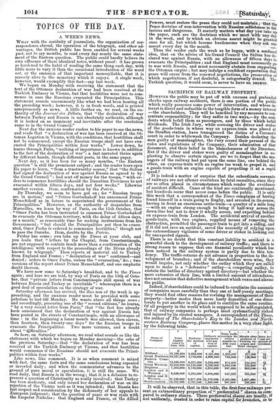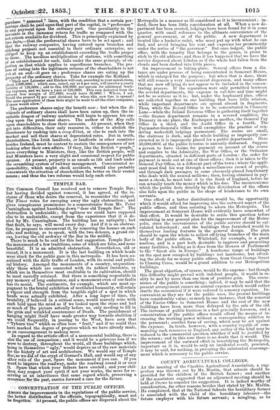SACRIFICE OF RAILWAY PROPERTY.
HOWEVER the public may be put off with excuses and pretended checks upon railway accidents, there is one portion of the public which really possesses some power of intervention, and whose in- terest is direct and reducible to the tangible form of a money interest —the shareholders. They will be benefited by any measure to con- centrate responsibility; for they suffer in two ways,—by the acct. dents which befall them as passengers, and by those 'which befall dividends. The Irish Jury, while accusing the driver and stoker of the goods-train in whose way an express-train was placed at the Straffan station, have transgressed the duties of a Coroner's court in order to whitewash the Company. Besides declaring the men guilty of manslaughter, the Jury record their perusal of the rules. and regulations of the Company, their admiration of that document, and their belief in the blamelessness of the Directors.
But if the driver and stoker were guilty of manslaughter in ne- glecting to observe certain signals, are we to forget that the ma- nagers of the railway had put upon the same line, one behind the other, an express-train with an engine too weak to .propel it, and a goods-train with an engine capable of propelling it at a rapid speed P It is indeed a matter of surprise that the subordinate servants of railways are not oftener overtaken by fatal casualties, since they are so often placed in circumstances which render the avoidance of accident difficult. Cases of the kind are continually mentioned, but hundreds occur that never come before the public. It is only this week that a correspondent of the Times complains of having found himself in a train going to Rugby, and arrested in its eourse, having in front an enormous cattle-train—a quarter of .a mile long —with an engine strong enough to bring it half-way across the down-line but not to draw it wholly across, and expecting behind an express-train from London. The accidental arrival of another goods-train, with two engines, supplied means of removing the obstruction, permitted the passenger-train to get into a siding, and if it did not save an accident, saved the necessit of relying upon the extraordinary vigilance of some driver or stoker in looking out for unexpected signals.
There is no doubt that this constant liability to accident is a powerful check to the development of railway traffic ; and there is strong reason to suppose that one financial peculiarity which has been noticed in the railway system is partly due to this ten- dency. The traffic-returns do not advance in proportion to the de- velopment of branches ; and if the shareholders were wise, they would inquire, not only whether the outlay which they are called upon to make is a " defensive" outlay—a competing outla.y, to sustain the battles of directory against directory—but whether the mere extension of their line, with a limited amount of attendance, does not occasion that defective management which vexes and alarms the public.
Indeed, if shareholders could be induced to scrutinize the accounts of companies more carefully than they can at half-yearly meetings, they would find other reasons for revising the management of their property—better modes than mere hasty deposition of one direc- torate to put another in its place and to continue the same routine. Of all property in the world which is supposed to be selfregulated, that of railway companies is perhaps most systematically risked and injured by its elected managers. A correspondent of the Times, the author of The Shareholder's Key to the London and North western .Railway Company, places this matter in. a very clear light, by the following table.
Name of Company.
Total Capital raised to June 1853. 2
Preferen- Hal portion of capital.
3'
Ordinary unguaran• teed per- tion of capital.
4 Total tragic receipts for
twelve months to Seth June
last. 5 Mdrgin after payment of working ex- pelmet, and fixed charges
6
Rate pm cent per annum dividend.
A £ £
£ £
Midland 18,198,000 9,663,000 8,535,000 1,355,000 277,000 3 Great Northern 10,227,000 5,719,000 4,808,000 742,000 126,000
Eastern Coun- ties 13,166,000 6,212,000 6,954,000 874,000 184,000 21 Great Western 18,356,000 10,120,000 8,236,000 1,038,000 328,000 4 Brighton 7,365,000 2,750,000 4,615,000 607,000 205,000 4a London and 8.
Western ,. 8,820,000 2,212,000 6,608,000 647,000 245,000
3j
London and N
Western 31,156,000 9,877,000 1,279,000 2,565,000 1,027,000 5 South-eastern 10,221,000 2,787,000 7,433,000 807,000 236,000 31
It will, be observed, that in this table, the first-four railways pre- sent an extraordinary proportion of " preferential " shares as com- pared to ordisiary ithtu es. These preferential shares are mostly, if not uniformly, created inorder to raise capital for branches, or ti)
Purnwe shall be paid upon.that part of the capital, in " preference" fo apy payment upon the ordinary part. One peculiarity in the occepets .the, immense return for traffic as compared with the xe4,rotorn available for dividend. This is principally explained by two foots,—that the preferential shares have to be set apart ; and that the railway companies,. having entered upon branches and sidelong .projects not essential to their ordinary enterprise, are obliged to keep up an establishment exceeding the traffic proper to *Lem. The needless multiplication of stations, with something of an establishment for each, falls under the same principle of ob- jection as that which applies to superfluous branches. The pro. QOM of eating into the legitimate returns of the shareholders is not vet at, an end—it goes on ; preference shares are eating up the property of the ordinary shares. Take for example the Midland.
"Their new Leicester and Hitchen will cost, according to your calculations, about 3,000,000/. ; which sum, raised, say at 4 per cent, will involve a yearly liability of 120,0001. ; add to this 100,0001. per annum for additional work- ing expenses, end we have a total of 220,0001. This sum deducted from the present free margin of 277,0001. would leave 60,000/. ! Where, I ask, would the present 31 per cent dividend be when this new line is opened ? The same application of these facts might be made to all the other companies, if space would allow."
The. preference shares enjoy the benefit now ; but when the di- vidends of ordinary shares shall have been eaten up, then the in- satiable dragon of railway ambition will begin to appease his cra- ving upon the preference shares. The author of the Key calls upon shareholders to close their accounts. At present, when they get into difficulties, their only resource is, either to abolish the directorate by rushing into a coup d'etat, or else to rash into the market and sell their shares at depreciated rates. But in truth, shareholders, like Irish landlords, or landlords in other countries besides Ireland, must be content to sustain the consequences of not looking after their ownaffairs. If they, like the British " people," leave everything to Ministers, they, like the British people, will find Ministers have a very slight and occasional respect for public opinion. At present, property is as unsafe as life and limb under the scrambling system of railway management. Concentrated re- sponsibility, which might check accidents, would also probably concentrate the attention of shareholders the better on their vested means ; and thus the two reforms would help each other.



























 Previous page
Previous page